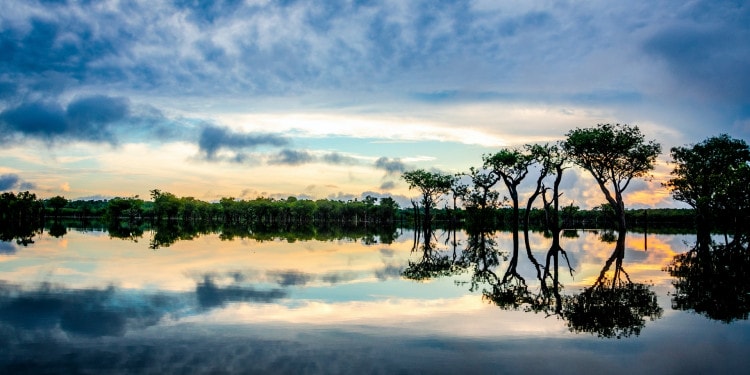Projects addressing ecological threats must support local communities.
Development projects undertaken at a local level will be crucial to addressing ecological threats and supporting the most vulnerable communities
Experts speaking at a recent Institute for Economics and Peace (IEP) event agreed that there is a strong connection between local development and climate change issues.
The online event launching the findings from IEP’s recent Ecological Threat Register (ETR) in Portuguese, highlighted important facts for Brazil, a country that has suffered 123 climatic disasters since 1990 and falls within the top 20 countries most affected by extreme weather events.
According to the ETR, eight disasters led to the displacement of 295,000 people in Brazil in 2019. Wildfires in Brazil’s Amazon made global headlines last year and brought attention to ecological issues affecting the country, but the ETR shows that floods pose the greatest natural threat to Brazilians.
Simone Madalosso a Brazil-based representative of the conservation not-for-profit Rare, spoke about the importance of comparing data between national and regional levels to best support communities most vulnerable to ecological threats. For example, better monitoring system to track fishery practice and the health of the ocean environment.
Rodrigo Corradi from Local Governments for Sustainability stressed that increasing ecological threats in a specific area could have an exponential impact to the entire country. Urban areas are of particular concern. Better models are required to strengthen the resilience of cities, where the consequences of climate change can be more intense.
In order to preserve the most vulnerable communities, speakers at the event recommended a more integrated approach to local environmental and economic development processes and solutions.
Related Articles: From Brazil to Cameroon, Forest Communities Fight Climate Change | Brazil’s Forests Are Being Restored — Now We Can See Where
IEP hosted a virtual launch of the ETR from São Paulo, Brazil, in October. The webinar, delivered in Portuguese, was moderated by IEP country representative for Brazil, Renahan Gil. Guest experts included Simone Madalosso, Governance and Development at Rare, and Rodrigo Corradi, Institutional Relations and Advocacy Manager at Local Governments for Sustainability (ICLEI).
The inaugural edition of the ETR released in 2020, covers 157 independent states and territories and is produced by IEP. The ETR measures ecological threats countries are currently facing and provides projections to 2050. The ETR is unique in that it combines measures of resilience with the most comprehensive ecological data available to shed light on the countries least likely to cope with extreme ecological shocks, now and into the future.
Find out more about IEP’s global events and webinars here.
——
About the author: The article has been written by Renahan Gil, corporate and public affairs, for Vision of Humanity – brought to you by the Institute for Economics & Peace (IEP). The IEP investigates the impact of COVID-19 and future trends in economics, politics, social dynamics, conflict and development.
Editor’s Note: The opinions expressed here by Impakter.com columnists or contributors are their own, not those of Impakter.com. — In the Featured Photo: The Amazon Rainforest, Brazil. Featured Photo Credit: Sébastien Goldberg, Unsplash.









